Here's how Nightdive "brought the horror back to System Shock" in its remake of the sci-fi FPS classic
Interview |Game director Stephen Kick "wanted to see Dead Space levels of carnage"
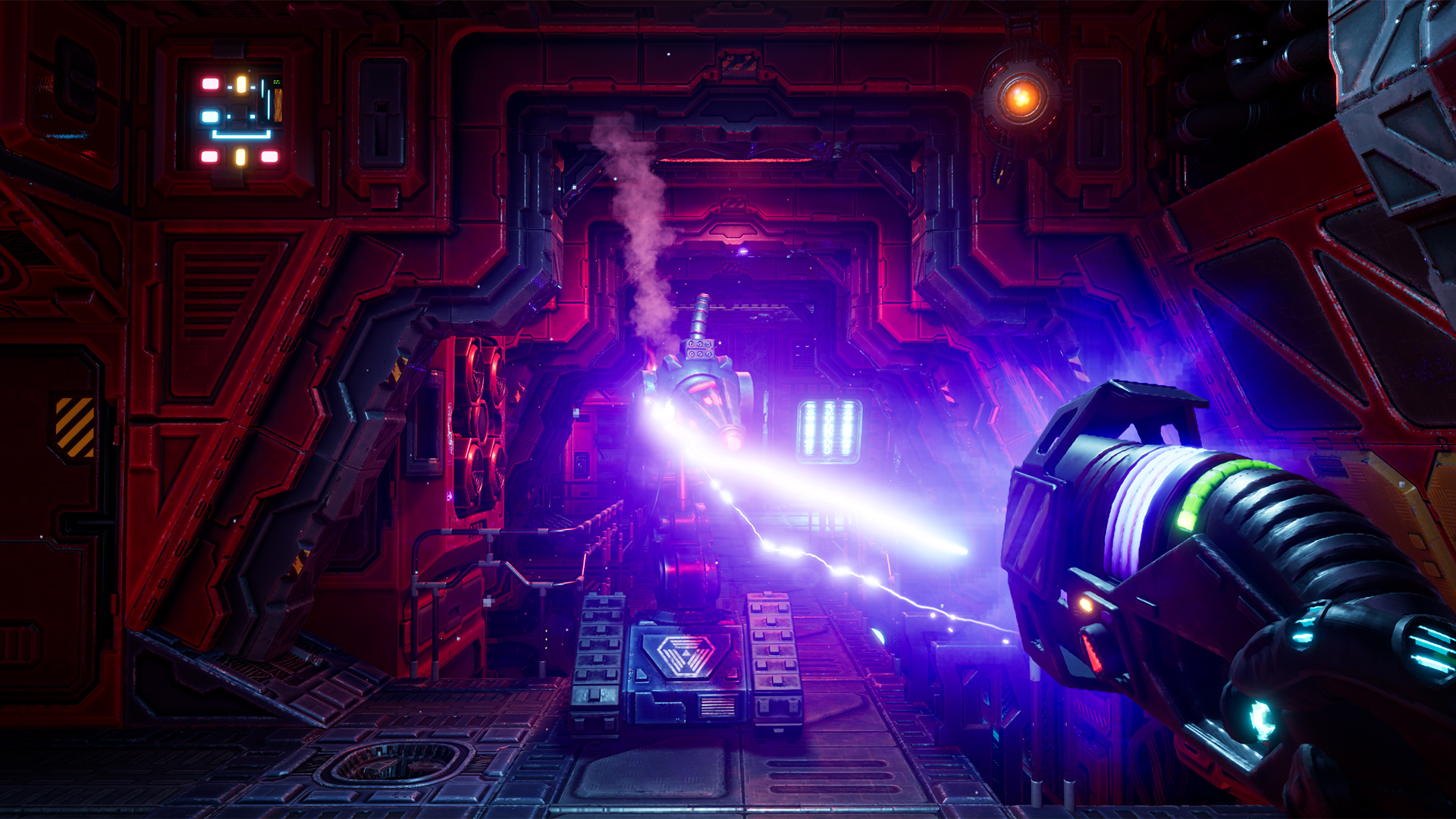
Nightdive is a studio on a noble mission: sourcing the rights to forgotten retro games, reformatting them to be playable on modern hardware, and bringing them to new and old audiences alike in turn. But for co-founder and director Stephen Kick, this journey started not far from where it's currently at.
"System Shock 2 was the first game that Nightdive ever released," he says of his 2012 endeavor to find and play a 1999 classic. "It's a horror video game masterpiece from a bygone era at this point. But yeah, horror video games in general have always been a big part of my personal DNA." He was named after Stephen King, after all, raised by horror-hound parents on a steady diet of EC comics and the works of HP Lovecraft. It sounds like a self-fulfilling prophecy that Kick is proud to embrace.
Nightdive's System Shock remake is proof of that, having launched on consoles earlier this week following a PC release back in 2023. The game provides a scarier, gorier, altogether enhanced FPS experience compared to Looking Glass Studios' 1994 original, and according to Kick, leaning into the horror elements was paramount to its success.
Techno freaks
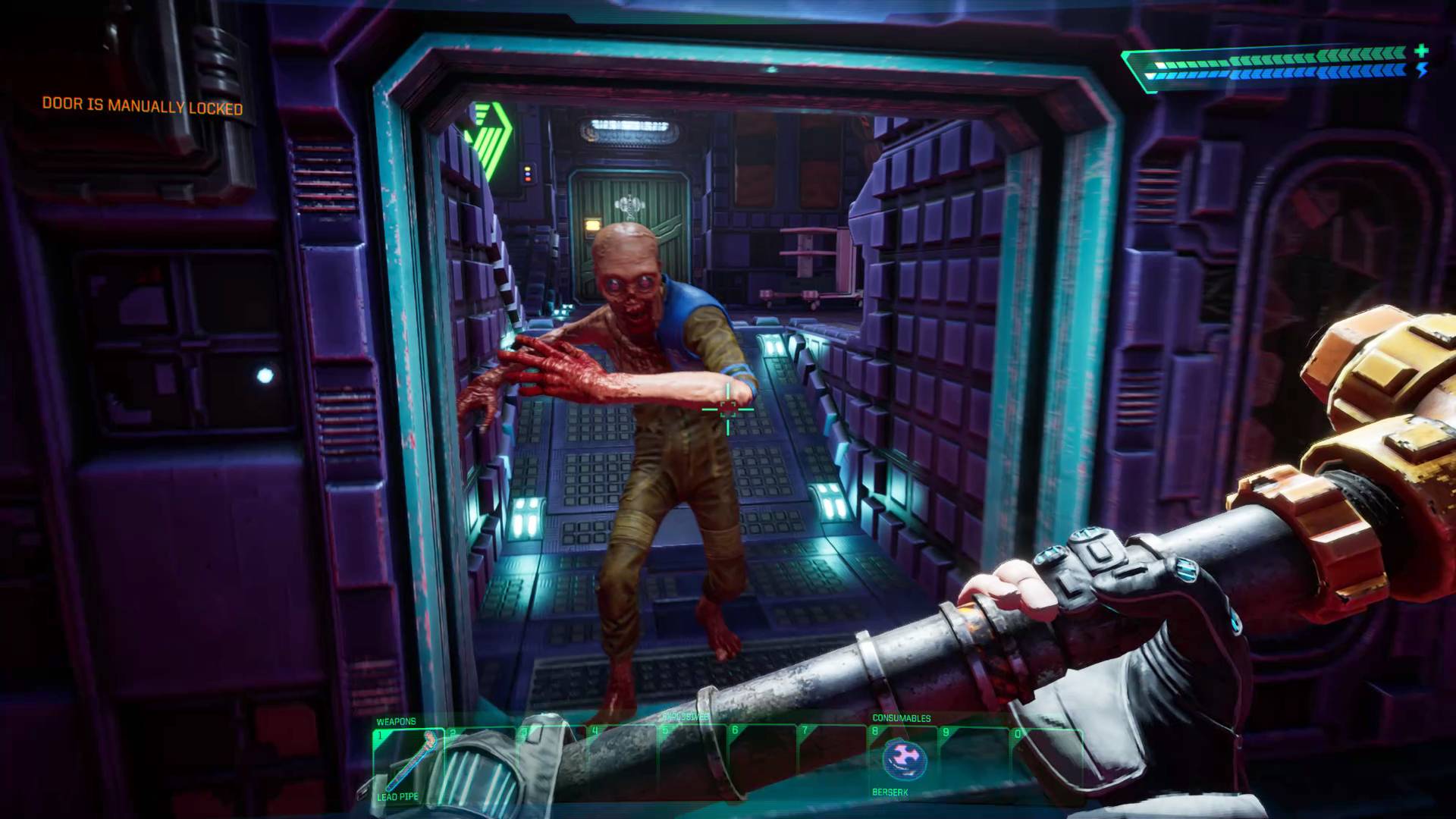
There's more to spooks than blood and guts, but Kick found that a great place to start. "One of the things that I expressed to the team was there's got to be a lot of gore," he says of the design and ambient changes Nightdive strives for in its System Shock remake.
"Even in the original, there's bodies on the floor. They're pixelated sprites, but there's still blood, you find severed heads, you find skulls, you find bones. I [said that I] want to see viscera, I want to see Dead Space levels of carnage, and we really push that to the extreme." The point of this is down to one thing: "atmosphere, that horrific feeling of waking up on board a space station, completely isolated and alone, with the only company being the corpses of the crewmates either lying on the floor in pieces, or shambling around as vengeful cyborgs hunting you down," says Kick. "We brought the horror back to System Shock, specifically, and that was [down to] a combination of the lighting and the ambience and the music probably more so than anything."
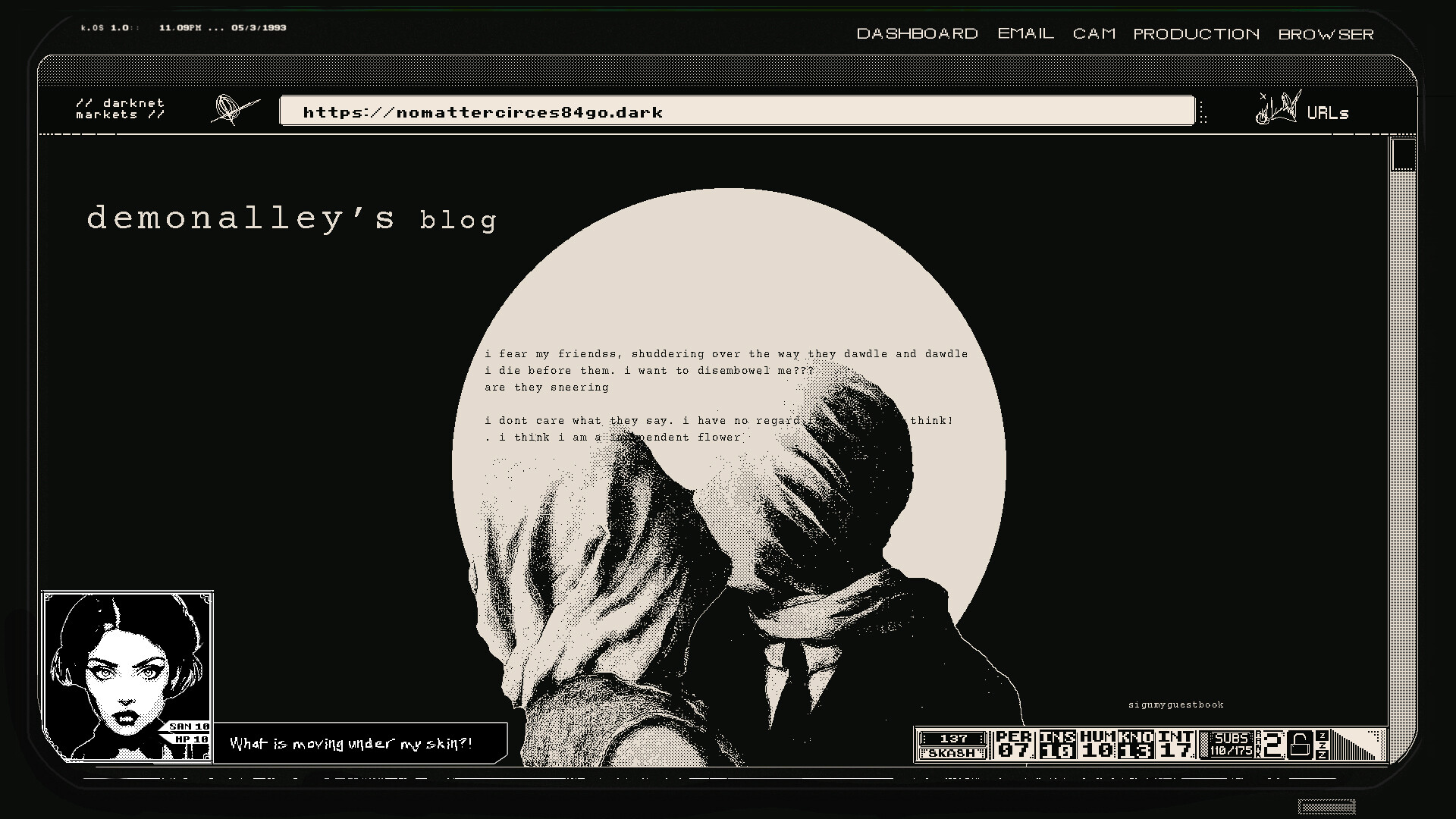
darkwebSTREAMER is a "narrative roguelike" that interrogates the voyeuristic horror fan in us all
Musically, it's a far cry from the original. Looking Glass evoked a sense of futuristic sci-fi adventure more so than the horrors of its protagonist's entrapment, with Kick describing the 1994 game's musical score as "upbeat," and "almost like an early kind of techno soundtrack. And the soundtrack that we brought in is definitely more rooted in the ambience, an orchestral horror kind of music that you would be used to [hearing] in a movie or a contemporary game like Resident Evil or Silent Hill." Imagine all this paired with echoing tunnels of sheeted metal, stretching on and on as the rumblings of machinery mask the sound of something just around the corner.
"The horror was definitely something that we wanted to push - something happened on board the station that was truly horrific. We wanted to put you in the shoes of the people that had to experience that. And I think that, you know, given the technological advantages that we had to work with and the tools that we had, I think we pushed it to that limit." Gameplay-wise, though, the System Shock remake never veers too far off course. It's still a first-person shooter-meets-survival horror in space, though with tank controls blessedly swapped out for mouse-look and more audio files added to flesh out and tighten up its storytelling.
Sign up to the GamesRadar+ Newsletter
Weekly digests, tales from the communities you love, and more
Splat to the future
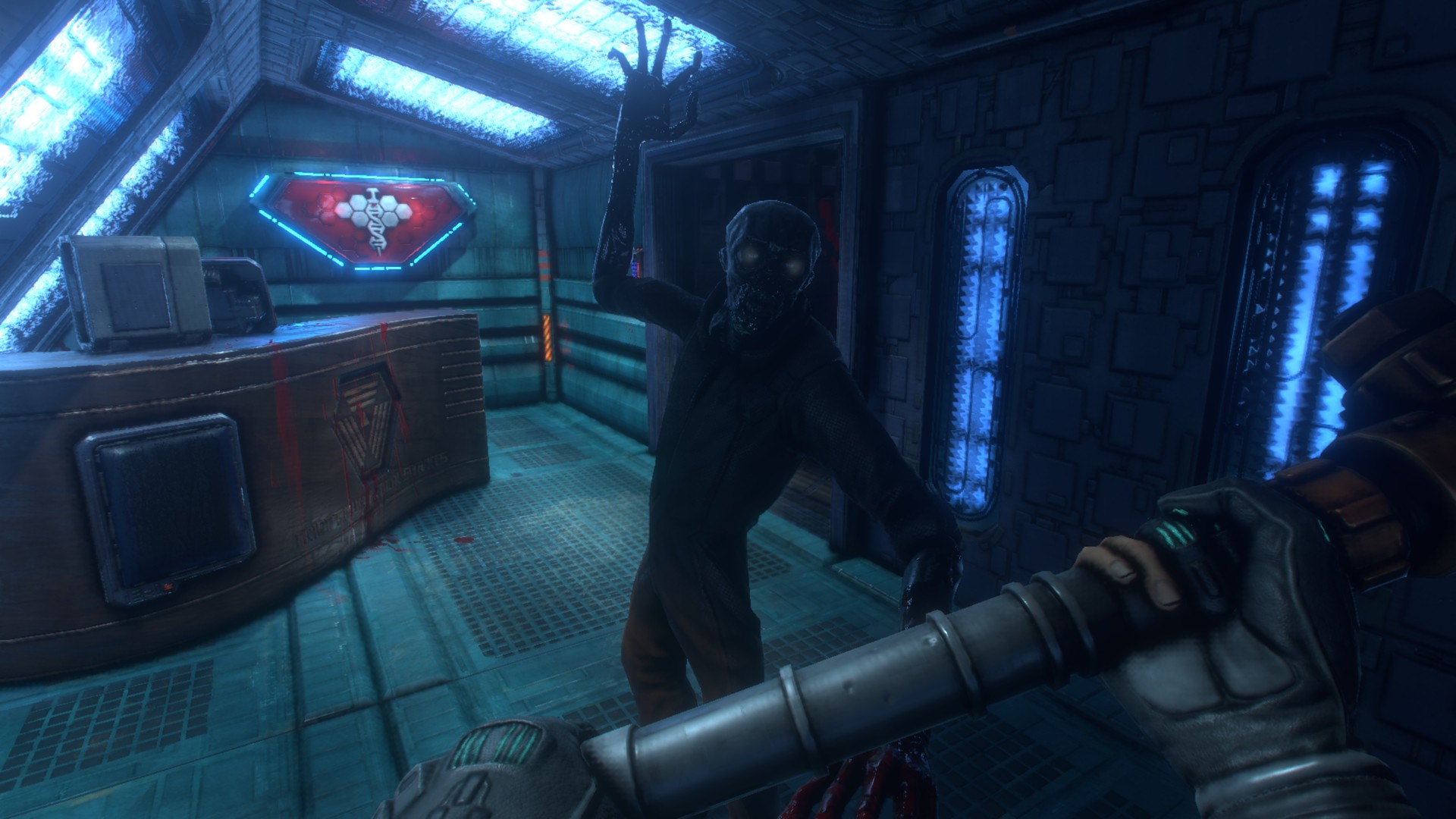
With the concept of horror being an ever-changing beast, flexing and contorting to reflect societal fears back at the masses at any given point in time, you might expect Nightdive to have tweaked 30-year-old System Shock's themes at least a little. But aside from this tighter focus on body horror, gore, and atmospheric tension, the game bears down on its thematic fears to show they're still relevant to this day.
"I think that our decision to remake System Shock came at a really timely moment in history too," says Kick. "The other side of the horror coin here is the existential dread. It's the presence of artificial intelligence in our lives." Kick takes a moment to assess his words, though I don't disagree with his first instinct.
"It's... I don't want to use the word 'infected', but it's become a part of everyday life," he says, using the sophisticated nature of AI-generated art as an example of worrying recent tech developments. "The story of System Shock revolves around an artificial intelligence that has its ethical constraints removed. Which is, again, a very real issue that we have to think about and we have to talk about, because if an artificial intelligence just has its way and can do whatever it wants, what is it going to do? What's in its power? How is it going to see the human race? Is it going to see us as a threat? Is it going to see us as an essential part of its existence? Is it going to see us as, like in System Shock, a bunch of insects and monkeys that are just kind of banging around on tools, there for the enjoyment of its experimentation?" At the end of the day, System Shock is a stark reminder that contemporary fears are largely unchanged. "There's a lot of unknowns in our future, and this is a potential future that we could be looking at."
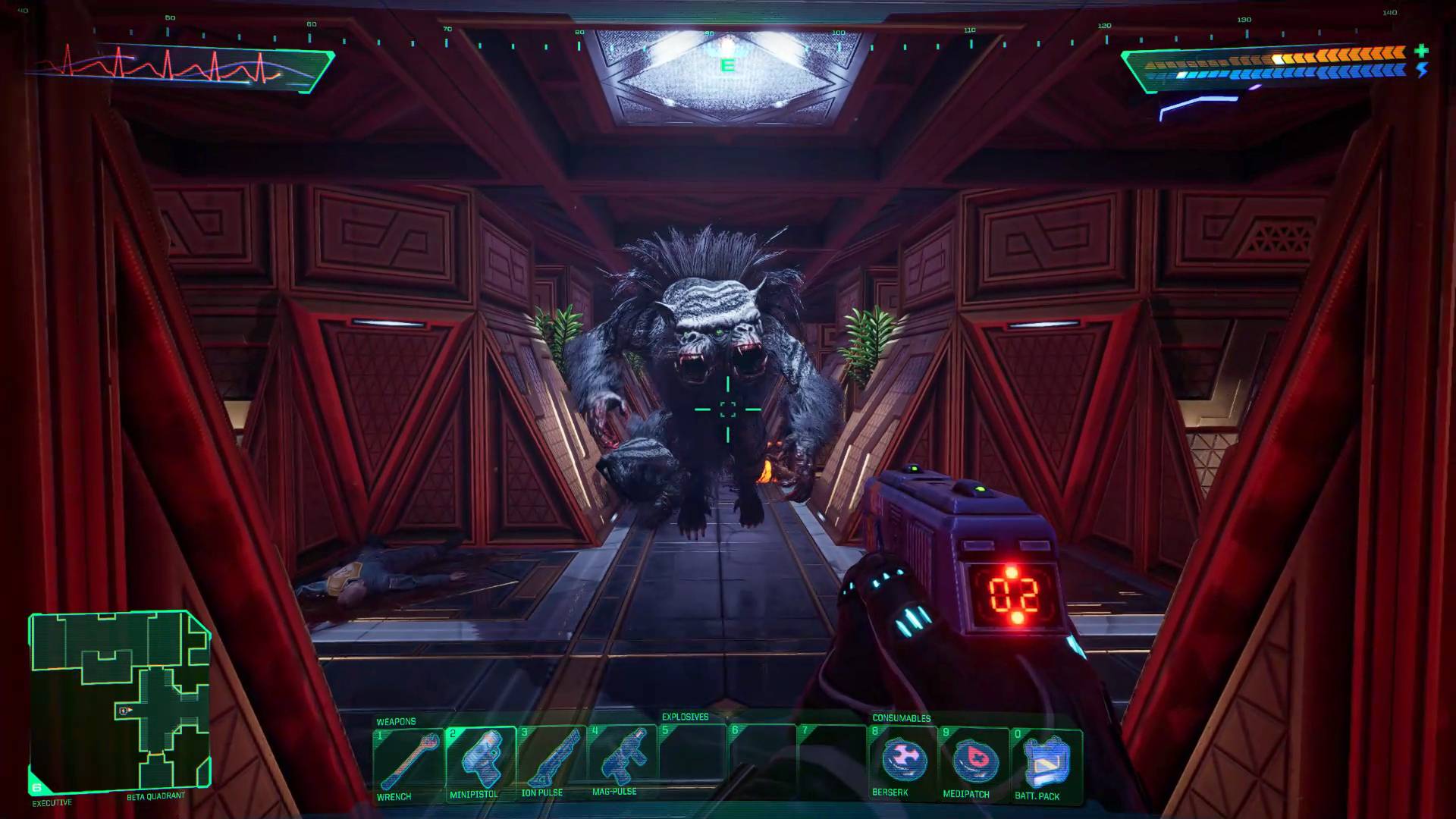
"One of the things that I expressed to the team was there's got to be a lot of gore."
Stephen Kick (Nightdive Studios)
On the subject of the future, I had to ask Kick if he sees Nightdive branching out with an original IP of its own someday, amid the litany of excellent remakes – something horror-shaped, perhaps, given all the biomechanical art and Alien memorabilia he's sitting among in his office?
"Yeah, that's been brought up a lot," Kick smiles. "Our intro that we play before all the games is this skull sitting inside of an old diving helmet at the bottom of the sea that gets pulled up by this tentacle in the darkness. That whole thing was meant to evoke this idea that there's this treasure, there's stuff in the darkness that's there for you to discover if you're willing to take the risk. And that embodied what Nightdive did, which is go out and find lost gaming treasures, bringing them back for people to enjoy and experience again.
"But when we first started putting out games and people saw this, the first thing that came back to me was, 'Oh, you should make a game about this. Like, you've got this mood and this ambience, and this music that would be perfect for something like that.' And so it's just been in the back of my mind, probably for like the last 11 years." He finally says the words I've been waiting to hear. "If we did an original IP it would no doubt be a horror game. Probably somewhere, you know, beneath the sea, having to do with ancient things sleeping. Not dead, but dreaming."
A Lovecraftian IP in the works from Nightdive? We, too, can but dream.
Check out the best survival horror games that will keep you on your toes, from Alan Wake to Silent Hill 2

Jasmine is a staff writer at GamesRadar+. Raised in Hong Kong and having graduated with an English Literature degree from Queen Mary, University of London in 2017, her passion for entertainment writing has taken her from reviewing underground concerts to blogging about the intersection between horror movies and browser games. Having made the career jump from TV broadcast operations to video games journalism during the pandemic, she cut her teeth as a freelance writer with TheGamer, Gamezo, and Tech Radar Gaming before accepting a full-time role here at GamesRadar. Whether Jasmine is researching the latest in gaming litigation for a news piece, writing how-to guides for The Sims 4, or extolling the necessity of a Resident Evil: CODE Veronica remake, you'll probably find her listening to metalcore at the same time.


